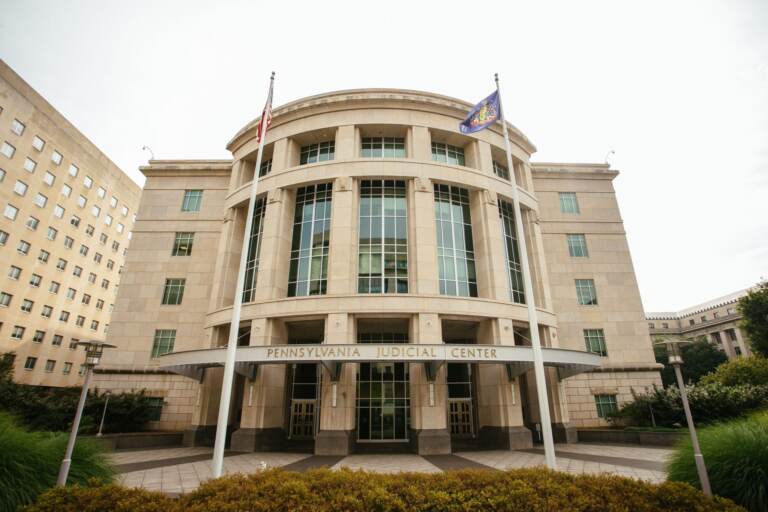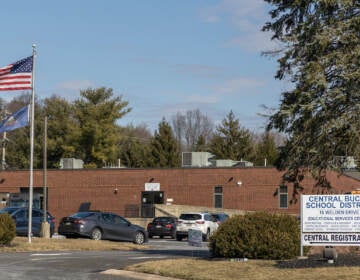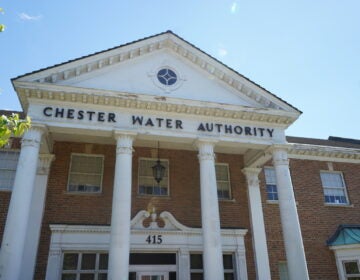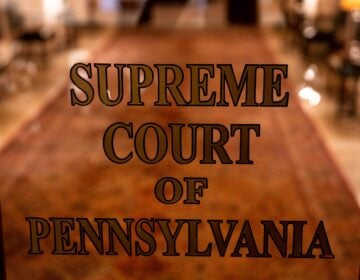Pa. Supreme Court allows challenge to 1982 law prohibiting Medicaid payments for abortions
Local pro-choice activists expressed elation after the decision was announced. Advocates on the other side lamented the decision.

The Pennsylvania Supreme Court ruled Wednesday that it will not await a lower court decision about the future of the state's congressional map and will instead take over the case. (Kent M. Wilhelm / Spotlight PA)
The Pennsylvania Supreme Court, today, gave pro-choice activists a win over a state law that prohibits the use of Medicaid funds for abortions, issuing an opinion that the right to reproductive autonomy is “fundamental.”
With four separate concurring opinions — three of which also dissented in part from the majority opinion — the 219-page decision in Allegheny Reproductive Health Center v. PA Department of Human Services is complex. However, the key — and unanimous — finding was that patients and abortion providers could challenge the state’s 1982 Abortion Control Act, which prohibits the use of Medicaid to cover funding for abortions.
The lower court, the Commonwealth Court, had previously said that access to abortion didn’t have anything to do with women’s rights or women’s equality and, therefore, the petitioners did not have merit to file the case — a decision the Supreme Court overruled.
Additionally, the Court decision included language calling the 1982 law “presumptively unconstitutional” on the basis of sex discrimination, though the majority did not necessarily agree.
The justices who did agree also noted that, while the government was not constitutionally obligated to provide public funding for any medical care, if the state did so, it would be required to provide patients access to abortions “to maintain neutrality so as not to intrude upon the constitutional right to full reproductive autonomy, which includes the right to terminate a pregnancy.”
The ruling does not mean that abortions will automatically be covered by the state’s Medicaid disbursement program. Rather, the court sent the case back to the lower court which will have to grant the petitioners their request for a hearing and resolve the issue under the new framework set by the higher court.
A group of Pennsylvania abortion providers filed the lawsuit in 2019, arguing the state’s Medicaid abortion coverage ban violated the Equal Rights Amendment and equal protection provisions of the Pennsylvania Constitution. Eventually, they petitioned the state Supreme Court, which heard oral arguments in October of 2022, leaving the petitioners waiting for the decision until today.
Local pro-choice activists expressed elation after the decision was announced.
“The Court gave our clients an enormous victory this morning,” Women’s Law Project co-executive director Susan J. Frietsche, one of attorneys who argued the case before the Court on behalf of the providers, told WHYY News. “The handling of this matter by the Pennsylvania Supreme Court was deep, scholarly, thoughtful, complex and very connected to the reality of women’s experience.”
Advocates on the other side lamented the decision, such as Maria Gallagher, Legislative Director for the Pennsylvania Pro-Life Federation, who accused the Supreme Court of activism.
“This is a tragic development in Pennsylvania,” Gallagher told WHYY News. “There used to be a time when they just kept their opinions on certain issues out of their court rulings. I fear that with this ruling we’re seeing ideology trumping justice.”
The ruling means the Commonwealth may soon become the 18th state in the Union to provide Medicaid funding for abortions beyond the restrictions imposed by the federal government. The Hyde Amendment, first passed in 1977, bars the use of federal funds to pay for abortion, except to save the life of the woman, or if the pregnancy arises from incest or rape. However, states are empowered to use Medicaid funds for the procedure if they so choose.
The laws in the 32 other states, along with Washington, D.C., currently follow or parallel the federal standard. Fourteen of those states, such as Alabama, Louisiana, Kentucky, and Texas, outlawed abortion following the Dobbs v. Jackson U.S. Supreme Court decision overturned Roe V. Wade. Several others have placed severe restrictions, making abortion almost completely inaccessible.
National pro-choice advocates also see the ruling as the latest development in a nation deeply divided by the question.
“These Medicaid bans have harmed the most vulnerable the stakeholders, people of color, poor people, rural people,” Lizz Winstead, founder of Abortion Access Front told WHYY News. “Thank God, that’s a right in the Pennsylvania constitution. And thank God the Pennsylvania Supreme Court said you cannot be discriminated against because you need help from your government. If that help means access to abortion, you deserve that.”
Chief Justice Debra Todd dissented overall, arguing that the court is bound by its unanimous 1985 decision that originally affirmed the 1982 law. Justice Sallie Updyke Mundy added that there wasn’t a right to taxpayer money to pay for abortions. However, enough justices agreed that a review is in order and the ruling lower court must decide whether Medicaid can indeed cover the procedures in Pennsylvania.

Get daily updates from WHYY News!
WHYY is your source for fact-based, in-depth journalism and information. As a nonprofit organization, we rely on financial support from readers like you. Please give today.






